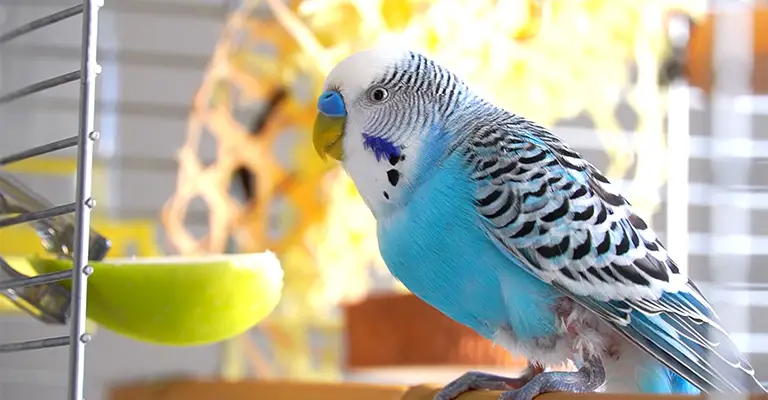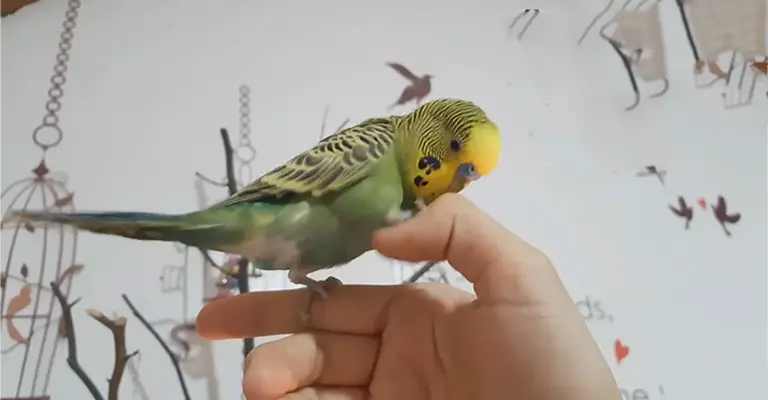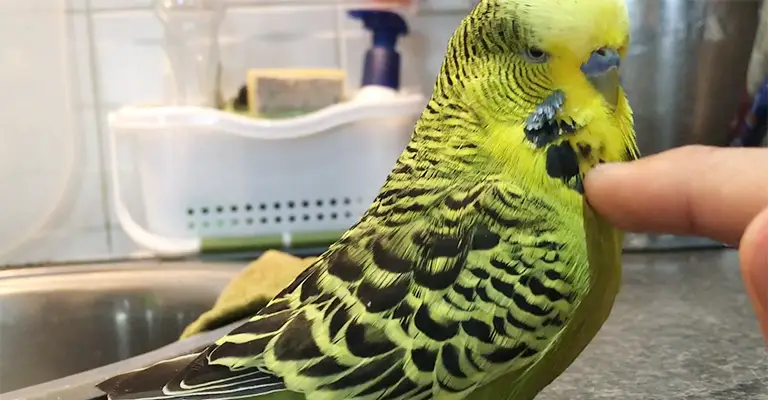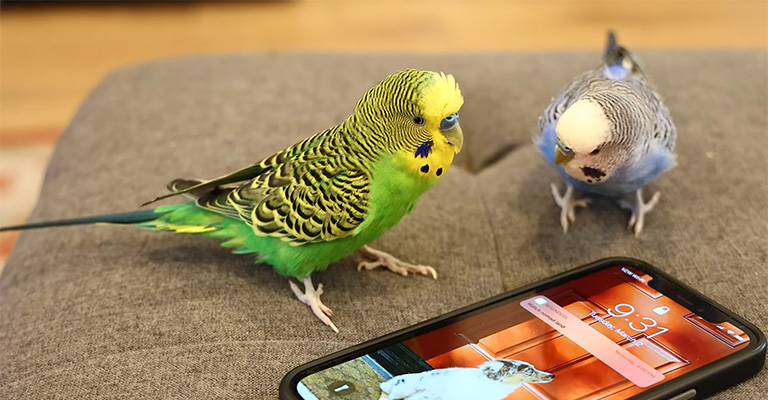In the enchanting world of pet birds, the preferences and behaviours of budgies continue to intrigue and captivate their human companions.
Among the myriad of interactions that unfold, the inclination of some budgies to relish being petted offers a heartwarming glimpse into the intricate connections between these avian creatures and their human caregivers.
The reasons behind this fondness for tactile engagement shed light on the multifaceted nature of budgie personalities, their social inclinations, and the bonds they form with those who care for them.
Exploring why some budgies like being petted unveils a narrative of trust, sensory pleasures, and the subtle harmonies of interspecies relationships.

Why Do Some Budgies Like Being Petted?
Some budgies like being petted because:
Bonding and Trust
Budgies that enjoy being petted have likely developed a strong bond and trust with their human caregivers. Regular positive interactions create a sense of security that allows them to feel comfortable being touched.
Social Mimicry
In the wild, budgies engage in mutual preening as a social bonding activity. When budgies enjoy being petted, they might view human touch as a form of preening akin to their natural behaviours.
Sensory Stimulation
Budgies have highly sensitive feathers, and gentle petting can stimulate their senses, creating a pleasurable experience for them.
Physical Comfort
Being gently stroked can relax budgies and induce a feeling of physical comfort, similar to how we might enjoy a massage.
Positive Associations

If petting is associated with positive experiences like treats, bonding time, or gentle interactions, budgies are more likely to enjoy and seek out this attention.
Exploration and Play
Some budgies might enjoy the novelty of being touched, considering it a form of exploration and play, especially if they’re naturally curious.
Variety in Interaction
Budgies, like any intelligent creature, enjoy diversity in their interactions. Petting provides a different form of engagement beyond vocalization and visual interaction.
Attention and Affection
Budgies are social animals that thrive on attention and affection. Being petted fulfils their social needs and reinforces the bond between them and their caregivers.
Individual Preferences
Just like humans, budgies have individual preferences. Some might naturally enjoy tactile interactions due to their unique personalities. It’s important to note that not all budgies enjoy being petted, and respecting their boundaries is key.
Observing their body language, responding to their cues, and gradually introducing touch can help establish a positive association with petting for those budgies who enjoy it.
How Do You Tell If Your Budgie Is Comfortable With You?

Some of the signs that your budgie is comfortable with you are:
Relaxed Body Language
A comfortable budgie will display relaxed body language. Its feathers will be smooth and unruffled, and it won’t be fluffing up or crouching defensively.
Approaches You Confidently
A budgie that’s comfortable with you will approach you willingly without signs of fear or hesitation. It might hop onto your hand or shoulder without frantic attempts to escape.
Curious Exploration
If your budgie shows curiosity by exploring your hand, clothing, or objects you offer, it indicates a level of comfort around you.
Preening in Your Presence
Budgies preen as a form of grooming and bonding. If your budgie preens itself in your presence, it’s a sign of trust and acceptance.
Vocalization and Chatter
Comfortable budgies are more likely to engage in soft chattering, singing, or mimicry when you’re around. This vocalization reflects their contentment.
Perching on You
Budgies that perch on your finger, shoulder, or head display trust and comfort. They see you as a safe and secure perch.
Relaxed Eye Pinning
When a budgie’s pupils dilate or “pin,” it’s often a sign of relaxation and comfort. If your budgie does this while interacting with you, it’s likely feeling at ease.
Remember that building trust and comfort with your budgie takes time, especially if it’s a new addition or not used to human interaction.
Respect its boundaries, offer treats, and create positive associations to nurture a strong bond over time.
Why Doesn’t My Budgie Like To Be A Pet?

There are many possible reasons why your budgie may not like to be a pet.
Here are some actions that you can take to understand and improve the situation:
Natural Instincts
Budgies are prey animals with a natural instinct to be wary of anything that approaches them, especially from above. This instinct to avoid potential threats is a significant factor in their resistance to being petted.
Lack of Familiarity
If your budgie hasn’t been exposed to consistent and positive human interaction from a young age, it might not be accustomed to human touch. This lack of familiarity can make petting uncomfortable for them.
Sensitivity to Touch
Budgies have highly sensitive feathers that serve various functions, including detecting changes in air pressure for flight. This sensitivity can make petting feel overwhelming or uncomfortable for some budgies.
Territorial Behavior
Budgies can be territorial about their personal space. Attempting to touch them might be perceived as an invasion of their territory, triggering defensive behaviours.
Individual Personality
Just like humans, budgies have unique personalities. Some might be naturally more reserved or independent, preferring minimal physical contact.
Previous Negative Experiences
If budgie has experienced trauma or negative interactions with humans in the past, they might associate human touch with those negative experiences and avoid it.
Fear of Restraint:
Budgies are flighty and value their freedom. Being held or restrained can evoke fear and anxiety, making them resistant to being petted.
Understanding and respecting your budgie’s preferences is crucial. While some budgies may never fully enjoy petting, you can still build a strong bond through positive interactions, offering treats, and creating a comfortable environment.
Always observe their body language and cues to ensure their well-being and comfort.
FAQ
Some budgies have developed trust and positive associations with humans, seeing petting as a form of bonding and comfort.
No, budgies have individual personalities. While some enjoy petting, others might find it overwhelming due to their natural instincts or past experiences.
You can gradually acclimate your budgie to petting by creating positive associations, offering treats, and respecting their boundaries. However, some might never fully enjoy it.
Relaxed body language, approaching you willingly, curious exploration, and relaxed eye pinning are signs that a budgie is comfortable with petting.
Signs of discomfort include fluffing up, crouching defensively, attempting to escape, or biting when touched. Respecting these cues is important for their well-being.
Conclusion
As we conclude our exploration into the world of budgies and their penchant for petting, we’re reminded of the intricate dance of trust and companionship that defines the human-budgie connection.
The reasons behind this fondness span from the bonds of social mimicry to the delight of sensory stimulation.
As we continue to engage with these feathered companions, we are invited to appreciate the unique personalities that each budgie possesses and the nuanced interactions that foster a deeper connection.
The joy of witnessing a budgie’s contentment through gentle touch serves as a reminder of the enriching role that humans play in the lives of these delightful avian friends.